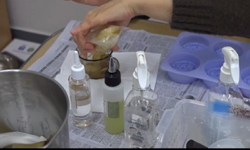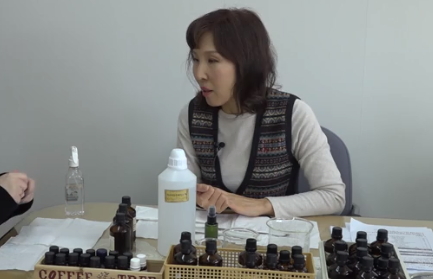This study was carried out to observe the antifungal properties of bergamot essential oil nanoemulsion (BEON). Particle size, zeta potential, polydispersity index, encapsulation efficiency, pH, electrical conductivity, color, and turbidity were observ...
http://chineseinput.net/에서 pinyin(병음)방식으로 중국어를 변환할 수 있습니다.
변환된 중국어를 복사하여 사용하시면 됩니다.
- 中文 을 입력하시려면 zhongwen을 입력하시고 space를누르시면됩니다.
- 北京 을 입력하시려면 beijing을 입력하시고 space를 누르시면 됩니다.
https://www.riss.kr/link?id=T16650935
- 저자
-
발행사항
제주 : 제주대학교 대학원, 2023
- 학위논문사항
-
발행연도
2023
-
작성언어
한국어
- 주제어
-
KDC
574 판사항(6)
-
발행국(도시)
제주특별자치도
-
기타서명
Preparation of Bergamot Essential oil Nanoemulsion and its Antifungal Activity
-
형태사항
62 p p. : 삽화, 표 ; 30 cm
-
일반주기명
지도교수: 천지연
참고문헌 : p. 52-61 -
UCI식별코드
I804:49002-000000010964
- 소장기관
-
0
상세조회 -
0
다운로드
부가정보
다국어 초록 (Multilingual Abstract)
This study was carried out to observe the antifungal properties of bergamot essential oil nanoemulsion (BEON). Particle size, zeta potential, polydispersity index, encapsulation efficiency, pH, electrical conductivity, color, and turbidity were observed to evaluate the physicochemical properties and storage stability of BEON. In order to analyze the antifungal activity of fungi, disc diffusion assay, minimum inhibitory concentration, minimum fungicidal concentration, and spore germination assay were conducted. In addition, BEON was applied to natural food like tangerines to confirm the effect of BEON by observing appearance and weight loss during storage. The study results confirmed that 40,000 (μg/mL) BEON was optimum with physicochemically stable and high antifungal activity. The storage stability of 40,000 (μg/mL) BEON was stable at 4°C for 35 days. In applying 40,000 (μg/mL) BEON to tangerines, fungi was observed below 9 mL, and was not seen above 23 mL, but the surface of the tangerines was damaged because of oil contact on the tangerine surface. In this study, the minimum and optimum condition of BEON was 15 mL of 40,000 (μg/mL) BEON, which has an antifungal effect. It is suggested that bergamot essential oil nanoemulsion may be effective in improving sell-by date or use-by date by improving food stability in the food industry.
목차 (Table of Contents)
- ABSTRACT 01
- LIST OF FIGURES 02
- LIST OF TABLES 04
- 1. 서론 05
- 2. 재료 및 방법 08
- ABSTRACT 01
- LIST OF FIGURES 02
- LIST OF TABLES 04
- 1. 서론 05
- 2. 재료 및 방법 08
- 2.1. Bergamot essential oil nanoemulsion (BEON) 제조 08
- 2.2. Bergamot essential oil nanoemulsion (BEON) 입자특성 관찰 08
- 2.2.1. 입자크기, 제타전위, 입도분포도 08
- 2.2.2. 캡슐화 효율 09
- 2.2.3. pH, 전기전도도 09
- 2.2.4. 색도 09
- 2.2.5. 탁도 10
- 2.3. 곰팡이 항진균 활성 10
- 2.3.1. 사용균주 및 배양조건 10
- 2.3.2. 디스크 확산법(disc diffusion assay) 11
- 2.3.3. 최소저해농도(MIC), 최소사멸농도(MFC) 11
- 2.3.4. Spore germination assay 12
- 2.4. 저장기간에 따른 저장 안정성 13
- 2.5. BEON이 과일의 품질 특성에 미치는 영향 13
- 2.6. 통계처리 17
- 3. 결과 및 고찰 18
- 3.1. Blank bergamot essential oil nanoemulsion (BBEON) 제조 18
- 3.1.1. HLB 및 유화제의 농도에 따른 BBEON의 입자특성 18
- 3.2. Bergamot essential oil nanoemulsion (BEON) 21
- 3.2.1. 색도 및 탁도 21
- 3.2.2. 입자특성 23
- 3.2.3. 외관 및 캡슐화 효율 25
- 3.2.4. pH 및 전기전도도 28
- 3.3. Bergamot essential oil nanoemulsion (BEON)의 항진균 활성 30
- 3.3.1. 디스크 확산법(Disc diffusion assay) 30
- 3.3.2. 최소저해농도(MIC), 최소사멸농도(MFC) 33
- 3.3.3. Spore germination assay 35
- 3.4. 저장기간에 따른 bergamot essential oil nanoemulsion (BEON)의 저장 안정성 39
- 3.4.1. 외관 39
- 3.4.2. 입자특성 41
- 3.4.3. 캡슐화 효율 43
- 3.5. Bergamot essential oil nanoemulsion (BEON)이 과일의 품질 특성에 미치는 영향 45
- 3.5.1. 외관 45
- 3.5.2. 중량손실 49
- 4. 결론 51
- 5. REFERENCES 52











